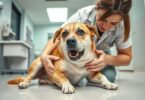Diarrhea in dogs is more than just an uncomfortable situation—it’s a sign that something’s amiss. As a pet owner, seeing your furry friend uncomfortable can be worrying. Diarrhea isn’t a disease itself but a symptom of various underlying issues, ranging from dietary mistakes to infections. Understanding the cause is key to helping your dog feel better.
Every dog will experience loose stool or diarrhea at some point. The stool’s appearance and severity can vary, so monitoring these symptoms is crucial. Whether it’s a sudden change in diet or a parasite, pinpointing the cause helps determine the best course of action.
This guide offers expert-backed tips and treatments to help you decide whether home care or a vet visit is needed. We’ll cover simple remedies like fasting and bland diets, as well as when professional help is necessary. Common causes include dietary indiscretion, infections, or toxins, so staying informed is your best tool.
Understanding Diarrhea in Dogs: Symptoms, Types, and Impact
Diarrhea in dogs is a common issue that can stem from various causes, ranging from dietary changes to infections. It’s not just an uncomfortable situation for your pet but also a signal that something might be wrong. Understanding what diarrhea is and its different forms can help you address it effectively.
What is Diarrhea in Dogs?
Diarrhea in dogs is characterized by loose, watery stools. It’s a symptom rather than a disease itself, often indicating an underlying issue. Factors like food intolerance, infections, or parasites can trigger it. Monitoring the consistency and color of your dog’s stool is crucial, as changes can signal different health concerns.
Types of Dog Diarrhea
There are four primary types of diarrhea in dogs:
- Osmotic Diarrhea: Caused by substances in the gut that draw water, like undigested food.
- Secretory Diarrhea: Triggered by toxins or hormones that increase fluid secretion.
- Exudative Diarrhea: Results from inflammation or infection, leading to mucus or blood in stool.
- Rapid Transit Diarrhea: Occurs when food moves too quickly through the intestines.
Health Impact and Behavioral Changes
Diarrhea can lead to dehydration and nutrient deficiencies. Dogs may show signs like lethargy or loss of appetite. Persistent diarrhea could indicate serious conditions like inflammatory bowel disease. Monitoring symptoms helps determine if home care or a vet visit is needed.
Recognizing these signs and understanding the types of diarrhea can help you provide the right care for your dog, ensuring their health and well-being.
Common Causes and Triggers
Your dog's digestive system can be sensitive, and several factors can lead to loose stools. Dietary indiscretion is a top cause, as dogs often eat things they shouldn't, like table scraps or garbage.
Internal parasites, such as worms or protozoa, are another common culprit. Infections from bacteria, viruses, or parvovirus can also trigger symptoms. Even certain medications, including antibiotics, can disrupt your dog's gut balance.
Stress and sudden changes in your dog's environment can also cause an upset stomach. For example, eating something toxic, like chocolate, or swallowing foreign objects can lead to issues. Identifying the root cause is key to effective treatment.
While many cases of loose stools resolve on their own, severe or prolonged symptoms require a vet visit. Always monitor your dog's health closely to ensure they receive the care they need.
Recognizing When to Seek Veterinary Care
Understanding when your dog's digestive issues require professional attention is crucial for their health. While some cases of loose stools resolve on their own, others signal more serious underlying problems.
Warning Signs to Watch For
If your dog's symptoms persist beyond 24-48 hours, it's time to consult a vet. Additional red flags include bloody stools, vomiting, or signs of dehydration like dry gums or sunken eyes. Lethargy and significant changes in behavior also warrant immediate attention.
Emergency Situations Requiring Immediate Attention
Some situations demand urgent care. If your dog ingests toxins or foreign objects, or shows severe vomiting, refusal to drink, or extreme dehydration, seek help right away. Puppies, seniors, and dogs with pre-existing conditions are at higher risk and should be seen sooner. For more guidance on understanding diarrhea causes and when to seek help, visit this resource.
Diagnosing Your Dog's Digestive Issues
Diagnosing digestive issues in dogs often begins with a thorough veterinary exam. Your vet will start by reviewing your dog's medical history and performing a nose-to-tail physical exam. This helps identify any underlying health problems that could be causing the symptoms.
Veterinary Exams and Diagnostic Tests
Common diagnostic tests include blood work to check for infections or inflammation, fecal exams to look for parasites, and imaging tests like X-rays or ultrasounds. In some cases, intestinal biopsies may be needed to rule out serious conditions like inflammatory bowel disease.
Interpreting Test Results and History
Understanding the test results alongside your dog's history is key to an accurate diagnosis. For example, blood work can reveal dehydration or infections, while fecal exams can detect parasites. These findings, combined with your dog's symptoms and history, help your vet determine the best course of action.
If test results indicate a serious condition, like parvovirus or a foreign object in the digestive tract, your vet will recommend immediate treatment. Always contact your vet promptly if your dog shows severe symptoms, as early intervention can make a big difference in recovery.
Home Treatments and Dietary Adjustments
When your dog experiences digestive upset, there are several home treatments and dietary adjustments that can help alleviate symptoms. These methods are designed to support your dog's recovery while ensuring their comfort and nutrition.
Fasting, Fluids, and Bland Diet Options
A short fasting period of 12-24 hours allows your dog's digestive system to rest and recover. During this time, ensure your dog stays hydrated with water or a diluted Pedialyte solution to prevent dehydration.
After fasting, introduce a bland diet with ingredients like plain white rice and canned pumpkin. These foods are gentle on the stomach and help firm up stools. Small, frequent meals can ease digestion and reduce the risk of overwhelming their system.
Introducing Probiotics and Supportive Foods
Probiotics can help rebalance your dog's gut microbiome, supporting recovery. You can find probiotics specifically formulated for dogs in various supplements or fortified foods.
When reintroducing regular food, do it gradually over 24-48 hours to prevent upsetting their stomach. Start with small portions of their usual food mixed with the bland diet, increasing the proportion of regular food each meal.
For mild cases, these home treatments can be effective. However, if symptoms persist beyond 48 hours or worsen, consult your vet. Always monitor your dog's response and adjust their care accordingly.
Medications, Supplements, and Advanced Interventions
When it comes to treating your dog's digestive issues, medication isn't always the answer. The right approach depends on the root cause of the problem. While some cases improve with home care, others may need professional intervention.
When Medication or Antibiotics Are Necessary
A vet might prescribe antibiotics if bacteria are causing the issue. However, antibiotics aren't always the solution and can sometimes do more harm than good. They can disrupt your dog's gut balance, leading to other problems.
Supplements like probiotics can help restore your dog's gut health. These can be added to their food to support recovery. In severe cases, fluid therapy might be needed to prevent dehydration.
Never give your dog over-the-counter medications without vet advice. Always follow professional guidance to ensure safe treatment.
For more on understanding diarrhea causes and treatment, visit this resource.
Preventative Measures and Long-Term Management
Keeping your dog’s digestive system healthy is key to preventing recurring episodes of loose stools. By implementing a few simple strategies, you can help your pet maintain a balanced gut and overall well-being.
Dietary Consistency and Environmental Controls
A consistent diet is essential for your dog’s digestive health. Sudden changes in food can upset their stomach, so always transition gradually. Mix small amounts of new food with their current diet over 7-10 days to avoid discomfort.
Regular veterinary check-ups are vital for early detection of potential issues. Your vet can monitor your dog’s health and recommend preventive measures, such as parasite control and vaccinations, to reduce the risk of infections.
Maintaining a clean living environment also plays a role in your dog’s health. Keep their food and water bowls clean, and ensure their living space is free from potential toxins or harmful substances.
Monitoring and Ongoing Care
Stay alert to changes in your dog’s stool consistency. If you notice persistent soft stools or any signs of illness, consult your vet promptly. Regular monitoring helps catch issues early, preventing them from becoming severe.
Working closely with your vet allows you to tailor a care plan that suits your dog’s specific needs. This partnership ensures your pet receives the best possible support for their digestive health.
Final Thoughts on Your Dog's Digestive Health
Monitoring your dog's digestive health is essential for their overall well-being. As discussed throughout this guide, loose stools in dogs can stem from various causes, ranging from dietary changes to infections. While mild cases may improve with home care, persistent or severe symptoms require professional attention.
For mild cases, home treatments like fasting and bland diets can be effective. However, if symptoms persist beyond 48 hours or worsen, it’s crucial to consult a vet. Early intervention can prevent complications and support a quicker recovery.
A balanced diet plays a key role in maintaining your dog's digestive health. Consider high-quality options like Science Diet dog food, which provides trusted nutrition. Regular check-ups and preventive measures can help avoid future issues.
Every dog is unique, so individualized care plans are best developed with your vet. Stay informed and proactive to protect your pet’s health. With the right approach, you can help your dog recover and thrive.
FAQ
What are the most common causes of diarrhea in dogs?
Common causes include dietary changes, infections, parasites, food allergies, or eating something harmful. Factors like stress or underlying health conditions, such as inflammatory bowel disease or liver disease, can also contribute.
When should I take my dog to the vet for diarrhea?
Consult your veterinarian if your dog has diarrhea lasting more than 48 hours, shows signs of vomiting, lethargy, or blood in the stool. Puppies and senior dogs should be seen sooner due to higher health risks.
Can I treat my dog's diarrhea at home?
Mild cases may improve with a bland diet of cooked chicken and white rice. Ensure your dog stays hydrated. However, always consult your vet before starting any treatment to rule out serious conditions like parvovirus or bacterial infections.










Leave a Comment